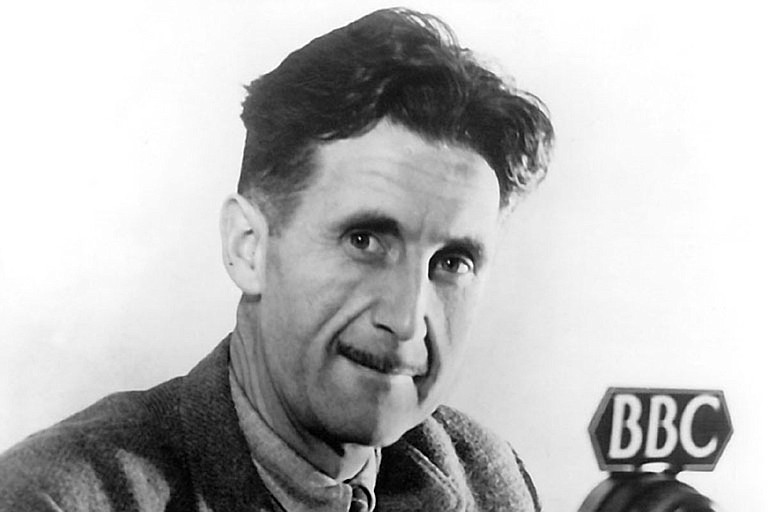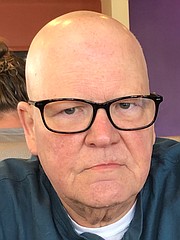George Orwell's "1984" has a certain poignance for today's world, especially as "alternative facts" proliferate and actual facts do down a "memory hole" like they're papers being shredded. Photo courtesy BBC/Public Domain
Tuesday, December 24, 2019
MADISON - Few novels have stood the test of time like "1984" by George Orwell (real name: Eric Arthur Blair).
Since its publication in 1949, many of the ideas and terms in the novel have come into common use, including Big Brother, Thought Police, thoughtcrime, doublethink and memory hole. Some think the book has become even more relevant in our "alternative facts" era.
Orwell's novel has endured while many similar works have faded from memory.
Many students in the United States read "1984" while in junior high or middle school. In spite of this, the novel has often been banned, including for being pro-communist. That is odd considering that Orwell's targets include the Soviet Union and its then-leader, Joseph Stalin.
In the novel, Winston Smith lives in London in what is called Air Strip One, a province of Oceania, a totalitarian superstate made up of North and South America, the British Commonwealth and southern Africa. Oceania is locked in eternal war with its two rival superstates, Eurasia and Eastasia,.
The Party, and its possibly mythical figure called Big Brother, rules Oceania. Posters warning that "Big Brother is watching you" blanket London. The Party rules every aspect of its citizens' lives, banning love and loyalty to anything but the Party. The Thought Police keep the population under constant surveillance, mainly through two-way televisions called telescreens.
The three superstates, whose governments are identical, constantly fight one or both of their rivals. None of the nations can ever win the war, although none of the governments will admit it. The superstates no longer use nuclear weapons and won't attack the enemy homelands. Instead, the fighting is confined to resource-rich areas of the Third World and polar regions.
One character in "1984" theorizes that the government of Oceania sends the missiles often fired at London to maintain the illusion of war.
The novel's main character is Winston Smith, a Party member who works at the Ministry of Truth, which churns out propaganda. Smith's job is rewriting history to make sure the Party is always correct. He also helps erase any person who has fallen out of official favor ("an unperson"). The Party also never acknowledges that its enemy in the war has changed periodically and rewrites history to say that Oceania has always been at war with the same nation or nations. Because of this, Smith says that even the date can't be confirmed.
The other ministries that rule Oceania are the Ministry of Peace (war department), the Ministry of Love (Thought Police) and Ministry of Plenty (mainly fictional economic planning).
Orwell was born in 1903 in India, where his father was a mid-level British civil servant. Orwell's mother took him and his siblings back to England in 1904. He wouldn't see his father again until he retired and came home in 1912.
After completing his education, Orwell joined the Imperial Police in Burma. He became a writer when he returned to England. He also became a committed socialist.
Orwell went to Spain in 1936 to fight on the Republican side in the Spanish Civil War, which was aided by the Soviet Union. He fought against the Nationalists, whom Nazi Germany and Fascist Italy supported.
Orwell became caught up in factional disputes with the Communists. Then he was shot in the throat during combat. The Communists threatened his life, and he had to escape from Spain.
World War II began in 1939. Orwell tried to join the British army, but was ruled medically unfit. He joined the Home Guard, the British militia for men who were too old, too young or unfit for military service. Based on his Spanish service, he taught a course on street fighting. He spent two years working for the BBC doing propaganda.
After the war, he began working on "1984." Meanwhile, Orwell was dying of tuberculosis. He finished the book in December 1948 and died in January 1950. It was only after his death that Orwell and his work became famous.
Orwell was not a prophet, although some of what is in "1984" did come true. The U.S. became one of the Cold War superstates, but it didn't turn into a dictatorship. What totalitarian state would allow its children to read a novel like "1984"?
Email Charles Corder at [email protected].
This essay does not necessarily reflect the views of the Jackson Free Press.


Comments
Use the comment form below to begin a discussion about this content.
Sign in to comment
Or login with:
OpenID